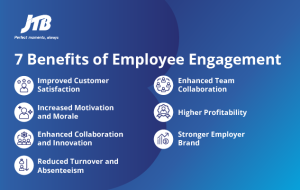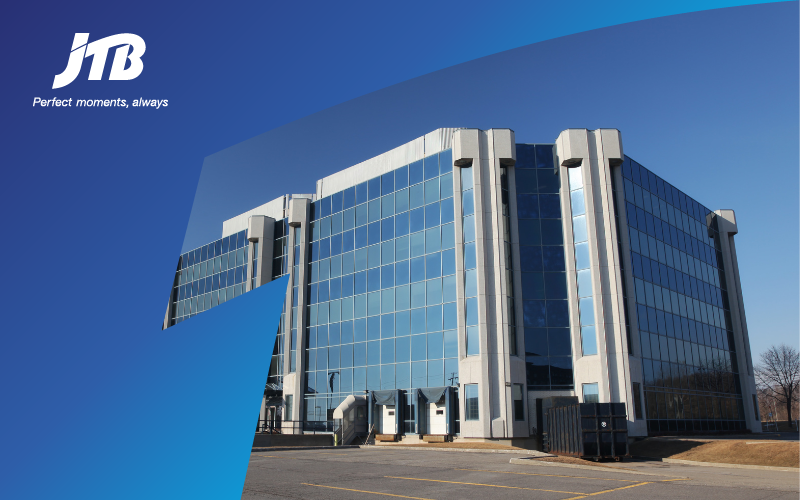Employee engagement isn’t merely about job satisfaction—it’s a potent catalyst for productivity, innovation, and business performance. As businesses strive for success, understanding and leveraging the benefits of employee engagement becomes paramount. In today’s competitive market, fostering engagement isn’t just a choice; it’s essential for sustainable growth. Also, highly engaged teams can boost profitability by 21%, highlighting the crucial role of employee engagement in driving results.
JTB India stands out for its expertise in corporate engagement and events. Their deep understanding of these areas makes them invaluable partners in enhancing workplace productivity through engagement initiatives. By aligning organizational goals with employee motivations, businesses can unlock various benefits. These range from improved morale to reduced turnover rates, fostering a culture of excellence and growth.
Benefits of Employee Engagement on Productivity
Let’s now dive into the advantages of having engaged employees in the team and workplace.
1. Increased Motivation and Morale
Corporate employee engagement significantly boosts motivation and morale within the workplace. Engaged employees feel a strong connection to their work, are enthusiastic about their tasks, and are committed to the goals of the organization. This leads to increased productivity and better overall performance. Engaged employees feel a sense of purpose and fulfillment in their work, driving them to put in extra effort and strive for excellence.
A positive work environment is key to fostering motivation and morale among employees. This can be achieved through effective communication, recognition of achievements, opportunities for growth and development, and a supportive company culture. Employees who feel valued listened to, and supported are more likely to be motivated and committed to their work. Additionally, motivation and morale boosts make employees self-driven, reducing the need for micromanagement. This enhances employee autonomy and allows management to focus on strategic initiatives rather than day-to-day supervision.
2. Enhanced Team Collaboration
Team collaboration refers to the ability of employees to work together effectively towards common goals, leveraging each other’s strengths and expertise. Effective collaboration fosters creativity, problem-solving, and synergy among team members, leading to improved project outcomes and organisational success.
Engaged employees are more likely to collaborate proactively, communicate openly, and share knowledge and ideas with their colleagues. They build strong relationships based on trust and mutual respect, actively seek feedback, and support each other’s growth and development. By promoting a collaborative culture and providing tools and platforms for communication and teamwork, organisations can harness their employees’ collective intelligence and creativity, driving innovation and achieving shared objectives more effectively.
3. Enhanced Collaboration and Innovation
Employee engagement promotes effective collaboration and innovation within the organisation. Engaged employees are more likely to work together as a cohesive team, share ideas, and contribute to problem-solving initiatives. This positive attitude towards collaboration and innovation is crucial for driving organizational growth and staying competitive in today’s rapidly changing business landscape.
When employees collaborate effectively, they can leverage their diverse skills and perspectives to develop creative solutions to complex problems. This leads to improved decision-making and better business outcomes. Additionally, engaged employees are more inclined to collaborate not only within the company but also with partners and stakeholders outside the company and even across different countries. This external collaboration broadens the scope of innovation and brings in new ideas and perspectives, further enhancing the organization’s ability to adapt and thrive.
4. Reduced Turnover and Absenteeism
Employee engagement significantly reduces turnover rates and absenteeism. Engaged employees are committed to their organization, making them less likely to leave their jobs voluntarily or miss work. According to Gallup, engaged employees are 17% more productive, and organizations with high engagement experience 81% less absenteeism.
High turnover rates and absenteeism can have a significant impact on an organisation’s productivity, morale, and bottom line. Recruiting and training new employees is time-consuming and expensive, and frequent absences can disrupt workflow and hinder productivity. By retaining engaged employees, organisations can save time and resources and maintain a stable and productive workforce.
Building a culture of engagement and investing in employee development and well-being are key strategies for reducing turnover and absenteeism. This can include providing opportunities for career advancement, offering competitive compensation and benefits, promoting work-life balance, and creating a positive and supportive work environment. When employees feel valued, respected, and invested, they are more likely to stay with the organisation and be present and engaged in their work.
5. Improved Customer Satisfaction
Engaged employees are those who are committed to delivering exceptional customer service and are dedicated to meeting the needs and expectations of customers. Satisfied customers are more likely to return to do business with the organisation, recommend it to others, and contribute to its long-term success. Engaged employees play a crucial role in delivering exceptional customer service and creating positive experiences for customers.
Research by Qualtrics XM highlights that companies with highly engaged employees see a 20% improvement in customer satisfaction scores compared to those with less engaged staff. Key strategies for boosting customer satisfaction include fostering a customer-centric culture and empowering employees. This can be achieved through providing necessary training and support, enabling employees to make decisions and take ownership of customer interactions, and recognizing and rewarding outstanding customer service.
6. Higher Profitability
Profitability is the capacity of an organization to generate revenue surpassing its expenses, thereby yielding financial gains and ensuring sustainable growth. Enhanced profitability enables organizations to reinvest in their personnel, products, and processes, fostering innovation, expansion, and enduring success. According to Gallup’s report on employee engagement, companies boasting a highly engaged workforce exhibit 21% higher profitability alongside 17% greater productivity compared to those with a disengaged workforce.
Engaged employees directly contribute to profitability through increased productivity, customer satisfaction, and operational efficiency. They are more committed, motivated, and aligned with organisational goals, resulting in higher sales revenue, lower operating costs, and improved profit margins. Moreover, a positive workplace culture and reputation for employee satisfaction attract top talent, further strengthening the organisation’s competitive position and financial performance over time.
7. Stronger Employer Brand
Employer brand encompasses an organization’s reputation and perception as an employer, significantly impacting its capacity to attract, retain, and engage top talent. A robust employer brand not only draws high-quality candidates but also diminishes recruitment expenses while fostering employee retention and loyalty. Research suggests that strengthening the employer brand can lead to a notable increase in employee engagement, projected to rise by over 36%.
Engaged employees serve as brand ambassadors, promoting the organisation’s values, culture, and workplace experience to potential candidates and external stakeholders. Their positive experiences and testimonials reinforce the organisation’s reputation as an employer of choice, increasing its appeal to top talent in the job market.
By investing in employee engagement initiatives, fostering a positive work culture, and prioritising employee well-being and development, organisations can strengthen their employer brand and position themselves as industry leaders, attracting and retaining the best talent in their field.
Employee engagement is essential for driving productivity and organisational success.
JTB India’s 3 Services for Cultivating Engagement and Productivity
Here are the 3 services that we offer to boost corporate employee engagement:
1. Strategic Meetings Management (SMM)
JTB India’s Strategic Meetings Management program empowers organisations to optimise event-related processes, enhance service quality, and foster engagement and productivity among employees attending corporate events and meetings. This comprehensive approach ensures seamless event planning and execution, from premises support and setup to organising live events and activities.
2. Meetings and Event Management Service (MICE Services)
JTB India’s Meetings, Incentives, Conferences, and Exhibitions (MICE) services go beyond traditional event planning to create engaging and memorable experiences for employees. These experiences foster a sense of belonging and motivation among participants, leading to improved productivity and performance. By organizing immersive and interactive events, JTB India’s Meetings and Event Management Service helps organizations build strong connections with their employees and cultivate a culture of engagement and productivity.
JTB India’s solutions for cultivating engagement and productivity encompass strategic meetings management, personalized corporate gifts, and immersive MICE services. By leveraging these offerings, organizations can create a supportive and engaging work environment that enhances employee satisfaction, morale, and ultimately, productivity.
3. Corporate Gift Solutions
JTB India’s Corporate Gift Solutions offer personalised tokens of appreciation that can significantly boost morale and reinforce engagement among employees. These customised gifts are tailored to align with the company’s employee development strategies, serving as meaningful reminders of appreciation and recognition. By investing in thoughtful and personalised gifts, organisations can contribute to a positive workplace culture and ultimately enhance productivity.
4. Japan Package
JTB India offers a comprehensive Japan package designed for corporate teams to experience the rich and diverse culture of Japan. This package provides an opportunity for employees to engage in unique activities that promote teamwork and collaboration. The itinerary includes visits to historical landmarks, participation in traditional tea ceremonies, and tours of cutting-edge innovation hubs.
These experiences not only immerse employees in Japanese culture but also enhance their problem-solving skills and strengthen team bonds. The Japan package by JTB India is a valuable investment in fostering employee growth, unity, and productivity through a blend of cultural and professional enrichment.
Conclusion
By fostering a culture of engagement, organisations can unlock numerous benefits that contribute to their overall success. These benefits include increased motivation among employees, enhanced collaboration and innovation, and improved customer satisfaction.
JTB India’s expertise in corporate events and meetings plays a vital role in supporting organisations in their efforts to cultivate engagement and drive productivity. With a deep understanding of corporate engagement and events, JTB India offers tailored solutions that help organisations create engaging and memorable experiences for their employees.
To cultivate a more engaged and productive workplace, we encourage readers to explore JTB India’s corporate event and meeting services. Whether it’s strategic meetings management, corporate gift solutions, or MICE services, JTB India provides the expertise and support needed to enhance and leverage the benefits of employee engagement to drive productivity.






















